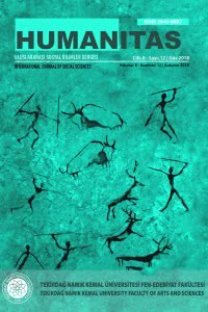MEZARLARINIZA TÜKÜRECEĞİM ÇEVİRİSİNDE “BİÇİMBOZAN EĞİLİMLER”İN YENİDENYARATICI BOYUTU
Çeviribilim alanında önemli bir kuramcı olan Antoine Berman, yazınsal metinler için erek odaklı çeviri yöntemini savunmuştur. Kuramcı, bu süreçte olası çevirmen eğilimlerini “biçimbozan eğilimler” olarak adlandırıp tanımlamıştır. Bu eğilimler kendilerini daha çok yazınsal metinlerin dillerarası çevirisinde göstermektedir. Çevirmen, bu eğilimlerle yapısal ve dilsel düzeyde bir biçimsel bozma işlemi gerçekleştirir. Fakat orijinal metnin anlamını, vermek istediği mesajı ve söylemek istediği şeyi korumak durumundadır. Çevirmen, varış metninde kaynak metinle (hemen hemen) aynı anlamı verebilmek için anlamsal boyutta bir yenidenyaratma işlemi de gerçekleştirir. Bir yandan, gösteren düzeyinde biçimbozan eğilimlerini deneyimleyen çevirmen diğer yandan da gösterilen düzeyinde kaynak metnin anlamını yeniden yaratır. Bu çalışmanın amacı, bazı biçimbozan eğilimlerin yenidenyaratıcı boyutunu ortaya çıkarmak ve bu biçimbozan-yenidenyaratıcı eğilimleri Boris Vian’ın Mezarlarınıza Tüküreceğim roman çevirisi üzerinden örneklendirerek göstermektir.
Anahtar Kelimeler:
Antoine Berman, biçimbozan eğilimler, yenidenyaratma, çevirmen, Mezarlarınıza Tüküreceğim
DIMENSION RECREATIVE OF THE “DEFORMING TENDENCIES” IN TRANSLATION OF I SPIT ON YOUR GRAVES
Antoine Berman, an important theorist of translation studies, supported the idea of target-oriented translation for literary translation. He referred to certain tendencies of the translator as “the deforming tendencies.” We can observe these deforming tendencies mostly in literary interlingual translations. The translator realises a formal destruction by deforming tendencies at a lingual or structural level but aims to protect the sense, the message and the thing that the original text wants to say. In order to give (almost) the same sense, the translator does a recreation of sense. On the one hand, he/she practises deforming tendencies of the signifier. On the other hand, he/she recreates the sense of the source text as the signified. The objective of this study is to notice the recreational side of certain deforming tendencies and to analyse these deforming and recreative tendencies in the Turkish translation of the novel I spit on your graves by Boris Vian.
Keywords:
Antoine Berman, deforming tendencies, recreation, translator, I spit on your graves,
___
- Berman, A. (1984). L’épreuve de l’étranger. Paris : Gallimard.
- Berman, A. (1989). La traduction et ses discours. Meta : journal des traducteurs, 34(4), 672-679.
- Berman, A. (1999). La traduction et la lettre ou l’auberge du lointain. Paris: Seuil.
- Genette, G. (1982). Palimpsestes. La littérature au second degré. Paris : Seuil.
- Lefevere, A. (1992). Translation, rewriting, and the manipulation of literary fame. London : Routledge.
- Motoc, D. (2002). Traduction et création : De la re-création du texte littéraire traduit à la créativité du processus du traducteur. Dans. La revue ARCHES, 4, 60-75.
- Vautour, R. T. (1998). Trois paroles épistémologiques chez Antoine Berman. Meta : journal des traducteurs, 43(3), 337-348.
- Vian, B. (1973). J’irai cracher sur vos tombes. Paris : Le Livre de Poche.
- Vian, B. (2015). Mezarlarınıza tüküreceğim. (B. Onaran, Tr.). İstanbul: İthaki. (Date de l’édition originale 1973).
- Créer, création (s.d.). Dans. CNRTL Lexicographie. https://www.cnrtl.fr/lexicographie/.
- Dignité (s.d.). Dans. CNRTL Lexicographie. https://www.cnrtl.fr/lexicographie/.
- Goujat (s.d.). Dans. CNRTL Lexicographie. https://www.cnrtl.fr/lexicographie/.
- Namus (s.d.). Dans. TDK Sözlük. https://sozluk.gov.tr/.
- Prendre pour (s.d.). Dans. CNRTL Lexicographie. https://www.cnrtl.fr/lexicographie/.
- Recréer, recréation (s.d.). Dans. CNRTL Lexicographie. https://www.cnrtl.fr/lexicographie/.
- Se dégonfler, salopérie (s.d.). Dans. BOB Dictionnaire de l’argot. https://www.languefrancaise.net/Bob/Introduction.
- ISSN: 2147-088X
- Yayın Aralığı: Yılda 2 Sayı
- Başlangıç: 2013
- Yayıncı: Namık Kemal Üniversitesi
Sayıdaki Diğer Makaleler
MEZARLARINIZA TÜKÜRECEĞİM ÇEVİRİSİNDE “BİÇİMBOZAN EĞİLİMLER”İN YENİDENYARATICI BOYUTU
PHILIP RIDLEY’İN KÜRKLÜ MERKÜR ADLI OYUNUNDA LABİRENTİMSİ MEKANIN TEMSİLİ
POSTMODERNİST ANLATININ BİLİM-KURGU İLE ANAKRONİK BULUŞMASI: KONSTANTİNİYYE ÜÇLEMESİ
ÇOCUK ŞİİRLERİNDE SORU, SORGULAMA VE FELSEFİ DÜŞÜNME: MUSTAFA RUHİ ŞİRİN ÖRNEKLEMİ
Onur Kemal BAZARKAYA, Nurseda KALEMCİ
BİR EŞYA OLARAK ARABA: LATİFE TEKİN’İN BUZDAN KILIÇLAR VE JOSÉ SARAMAGO’NUN “EMBARGO” ESERLERİ
RUMELİ DEMİRYOLLARI EGE DENİZİ BAĞLANTI HATTINDA YENİ BİR LİMAN KENTİ: DEDEAĞAÇ (1872-1912)
KEDERLİ VE KEDERLİ OLMAYAN YAŞAMLAR: PHIL KLAY’IN REORGANİZASYONU
AKTÖREL SEYİR VE AV: SOSYAL BEDEN KARŞISINDA ÇIPLAK BEDENİN EGEMEN OYUNU
